As a young, savvy company using the latest in technology, data and science to create a unique, sustainable solution for cities and municipalities while providing consumers with the highest-quality, STA Certified and OMRI listed compost for use in a various growing application, Atlas Organics shows no signs of slowing down.
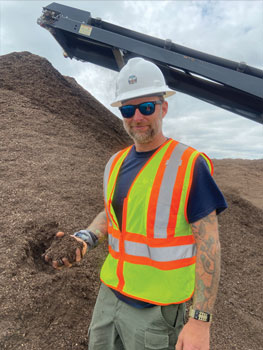 As an innovative and science-driven composting company headquartered in Spartanburg, SC, Atlas Organics has provided residential homes, corporations, local businesses and municipalities with both pickup of composting materials and delivery of the highest quality grade of finished compost across the eastern U.S. In 2015, Joseph McMillin, CEO and Gary Nihart, COO, formed Atlas Organics with a simple mission: become the best organics recycling company in the world in both quantity and quality of services delivered. Atlas Organics has seen an explosion of success and growth in past year and shows no sign of slowing down.
As an innovative and science-driven composting company headquartered in Spartanburg, SC, Atlas Organics has provided residential homes, corporations, local businesses and municipalities with both pickup of composting materials and delivery of the highest quality grade of finished compost across the eastern U.S. In 2015, Joseph McMillin, CEO and Gary Nihart, COO, formed Atlas Organics with a simple mission: become the best organics recycling company in the world in both quantity and quality of services delivered. Atlas Organics has seen an explosion of success and growth in past year and shows no sign of slowing down.
Currently, Atlas Organics is a developer and operator of compost facilities that are operated through public/private partnerships with municipalities or private acquisitions. Serving more than 1,600 homes, over 100 organizations with 135 employees in nine cities, Atlas Organics has public/private partnerships in place with Greenville County, SC, the City of Durham, NC, Indian River County, FL, City of Memphis, TN and City of San Antonio, TX as well as company owned facilities in Tampa and Port Charlotte, FL. These facilities operate by accepting feedstocks that are controlled by the municipality in exchange for a per ton tipping fee. These feedstocks are in long-term agreements with the municipalities and accept a variety of feedstocks, including yard waste, food waste and biosolids. Starting in 2022, Atlas Organics plans to expand product offerings and will operate in 12 locations across seven states in the U.S., including California, Connecticut, Florida, North Carolina, South Carolina, Tennessee and Texas.
Atlas Organics also accepts food waste from their internal hauling division into their facilities. Atlas Organics’ hauling division operates collections for commercial and residential customers in South Carolina, North Carolina and Tennessee, and also offers product delivery service in all markets a compost facility is present. After a 45-day extended aerated static pile composting process, Atlas Organics is left with a valuable soil amendment, compost, that is sold back into the agricultural, landscaping and home gardening markets (See Composting Process sidebar). In addition to these services Atlas Organics also provides development, operational, and technical services to municipalities as well as internal composting facilities.
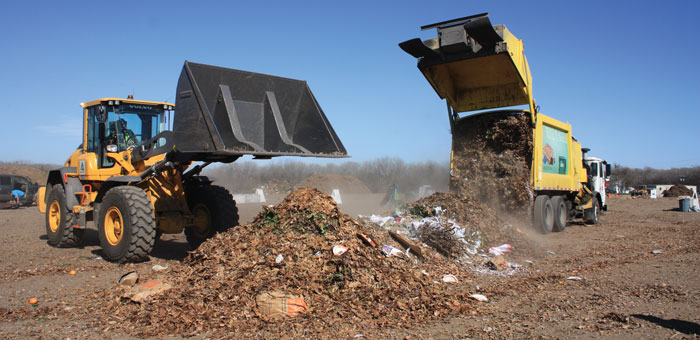
Inset: Atlas Organics General Manager Mike Larrivee inspecting material in the composting process.
Photos courtesy of Atlas Organics.
Responding to Current Challenges
According to Joseph McMillin, CEO of Atlas Organics, COVID-19 has not really impacted the organics recycling industry nearly as much as other industries. “We have seen a growing interest in composting. More people are concerned with how they are getting their food and there is a growing interest in eating healthier. We’ve also seen an increase in home gardens and raised bed installations. With those factors, there has been a natural increase in organic waste.” As a result, Atlas Organics had to run supplemental shifts at some sites to keep up with the demand and inbound inquiries for finished product increased drastically.
Gary Nihart, COO, explains that Atlas Organics was proactive by establishing a COVID task force at the beginning of the pandemic to meet weekly and monitor changing conditions, adjust policies, and respond to internal and external needs regarding the virus. “This has allowed us to stay nimble and prepared throughout the pandemic.”
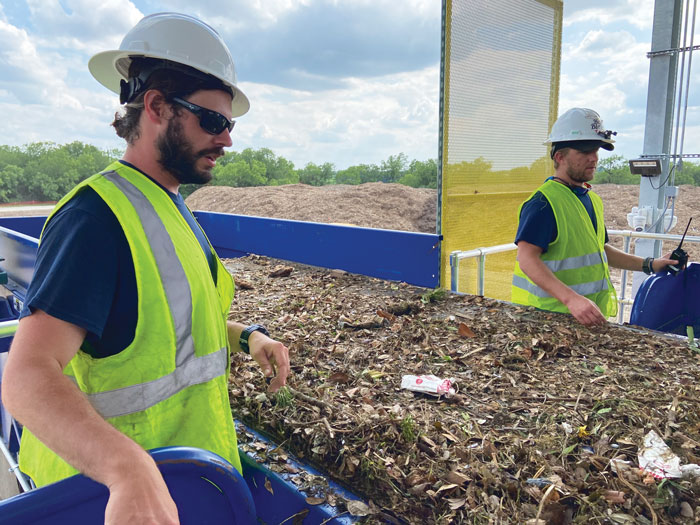
“Atlas Organics responded quickly to the rapidly changing could work remotely were offered the option. Self-quarantining guidelines were strictly enforced as well as distance protocols per the CDC and OSHA,” says Alston Sandzen, Health and Safety Manager for Atlas Organics. “Travel guidelines were put into place to decrease exposure as well as best practices to stay healthy so that Atlas Organics could continue services for municipalities and our customers.”
COVID-19 did affect the company’s labor issues on both the logistical side and at their sorting facilities, but Atlas Organics has met that challenge by attracting quality people. Atlas Organics takes great pride in having developed a very thorough and intensive hiring procedure. This process helps the company find the right candidates for the right position. “Our safety and training programs have vastly improved in the past 18 months and it’s a big reason why we retain our employees. The industry is relatively young, but we have one of the top training programs in the country, if not the world, for our operational teams,” says Nihart.
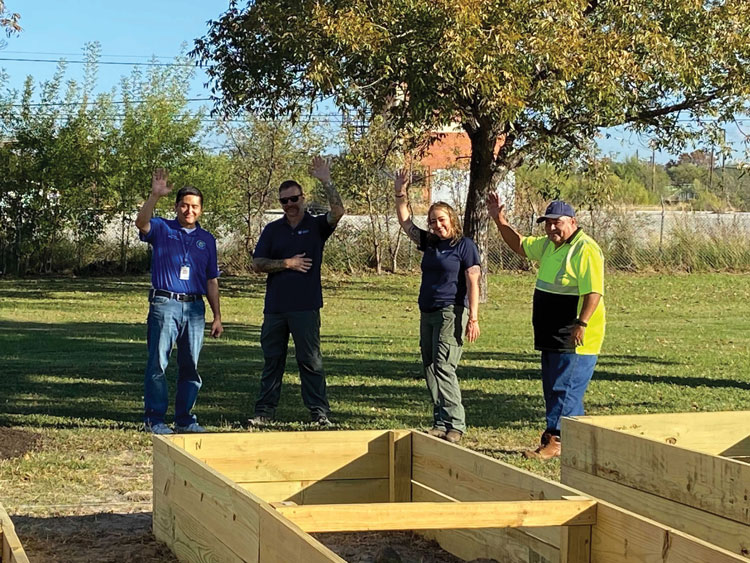
McMillin points out that contamination has also been a constant issue in the industry. The most common types they deal with are plastics, glass and stickers. The company is curbing that by using new technologies—specifically AI and machine learning. Atlas Organics is the first company in North America to use such technology in organics recycling. “Our Non-Organics Contamination Removal Automated Process (NOCRAP) is our patent-pending solution currently being used at our location in San Antonio, TX, and should be coming online at two other locations later this year.” Atlas Organics’ ground-breaking new AI composting sort line—NOCRAP—is part of a $10.8 million-dollar project with the City of San Antonio and their Green Cart Organics Recycling Program. The new sort line is the centerpiece of a state-of-the-art facility and addresses the serious issue of contamination in the organics recycling industry. “We have to have clean feed stock going into the process to derive a high value product on the back end of our process, which is extremely important to us and our
customers,” says McMillian.
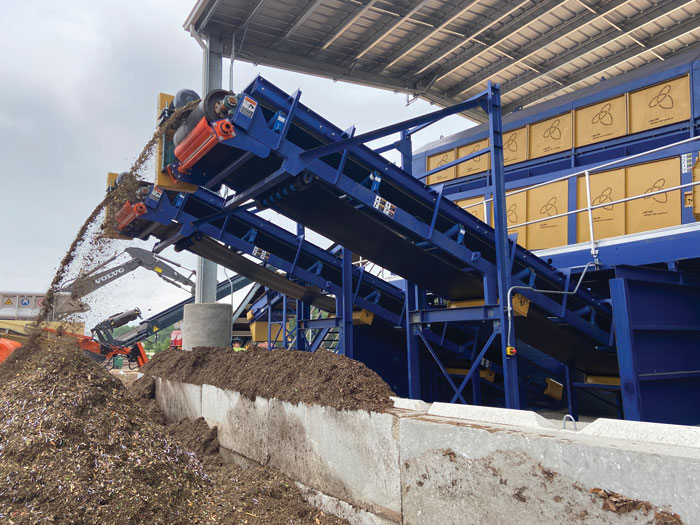
Atlas Organics, along with several key partners, including Rotochopper and AMP Robotics, delivers a successful solution driven by AI robotics technology. The new process sorts objects based on one or more provided criteria, such as a maximum weight and size. Using sort line cameras, every piece of material is visually recorded and machine learning and/or artificial intelligence is used to identify and remove objects that meet certain criteria. In the future, the robot sorting step could use other technologies for identifying and removing objects that meet certain criteria, such as infrared or other visual identification technologies. “To my knowledge, we are the first one in North America to use artificial intelligence to remove contamination in organics recycling,” says Nihart.
The industry has changed considerably in the past 18 to 24 months, says McMillin. The biggest challenge in the industry right now is that municipalities are having to comply with legislation without having proper infrastructure established. Atlas Organics provides the expertise and services to get communities where they need to be quickly, efficiently, responsibly, and in a cost-effective manner. “Organics recycling and closed-looped sustainability efforts were not something that was generally talked about, but now it is at the forefront of municipality conversations as the need is massive, especially with states like California where recycling laws are now being enforced. Municipalities are looking for companies like Atlas Organics to help.”
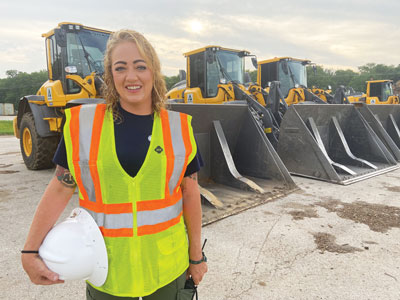
One Common Mission
To scale a composting business, it takes a lot of people, says McMillin. “If you can’t provide an end-to-end service and product, you ultimately will fail. I believe that our biggest achievement as a company is our people. Without them, our company fails. We have been very fortunate in finding people and investors who believe in the same mission we do. We have been purposeful in hiring experts in various verticals and bringing them into the composting industry. We naturally have experts in composting and engineering, but we also seek and attract diverse candidates with unique skillsets in accounting, data collection, legal, sales, customer service, marketing and more.
“The ultimate goal for Atlas Organics is to create the greatest organics recycling service in the world in terms of both quantity and quality of services rendered. Diversity of talent, skills, uniqueness and perspective of our people is our greatest strength. We are bound together by one common mission.”
Atlas Organics is a young, savvy company using the latest in technology, data, and science to create a unique, sustainable solution for cities and municipalities while providing consumers with the highest-quality, STA Certified and OMRI listed compost for use in a various growing application. The new sort line in San Antonio is just a glimpse of things to come for Atlas Organics and the company shows no signs of slowing down. “Our message is clear,” says Nihart. “At Atlas Organics, we believe that people can and should contribute to something larger than themselves.” With a mission this powerful, Atlas Organics is well on its way to doing just that and changing the world of organics recycling in the process.| WA
Composting Process
 Atlas Organics manages and processes a variety of organic materials, including yard waste, food waste, and biosolids at various facilities. The process begins with the grinding of yard waste using horizontal grinders fed by excavators. These machines take loose unground municipally collected yard waste and reduce it to a 4 to 6 inch minus single ground mulch. This material is the carbon source for the composting process. After the yard waste is ground, it is either added directly to the composting process or mixed with a nitrogen source such as food waste or biosolids at a ratio of approximately 50:50 by weight using wheeled loaders.
Atlas Organics manages and processes a variety of organic materials, including yard waste, food waste, and biosolids at various facilities. The process begins with the grinding of yard waste using horizontal grinders fed by excavators. These machines take loose unground municipally collected yard waste and reduce it to a 4 to 6 inch minus single ground mulch. This material is the carbon source for the composting process. After the yard waste is ground, it is either added directly to the composting process or mixed with a nitrogen source such as food waste or biosolids at a ratio of approximately 50:50 by weight using wheeled loaders.
This material is then put into the Extended Aerated Static Pile (EASP) composting system, which is comprised of blowers and an on-grade aeration piping system. With EASP composting, fresh air is blown into the pile under positive pressure to maintain aerobic conditions throughout the pile, eliminating the need for pile turning, accelerating the decomposition of the organic material, achieving pathogen reduction requirements, and preventing the generation of offensive odors.
Compared to typical windrow composting operations, Atlas avoids using a diesel-powered windrow turner and generating dust through pile turning, while maintaining optimal conditions to process material faster. Throughout the process, batches are monitored for bulk density, temperature, moisture, and maturity using various quality control methods and tools.
Once the material is fully composted, it is screened to a 3/8 inch or 1/4 inch minus using a trommel screen. This material is then lab tested as part of the US Compost Council’s STA Certification program. After results are analyzed to confirm national and state limits are met, the material is sold into the marketplace.
For more information, contact Stefan Holt, Vice President of Marketing for Atlas Organics at [email protected].
